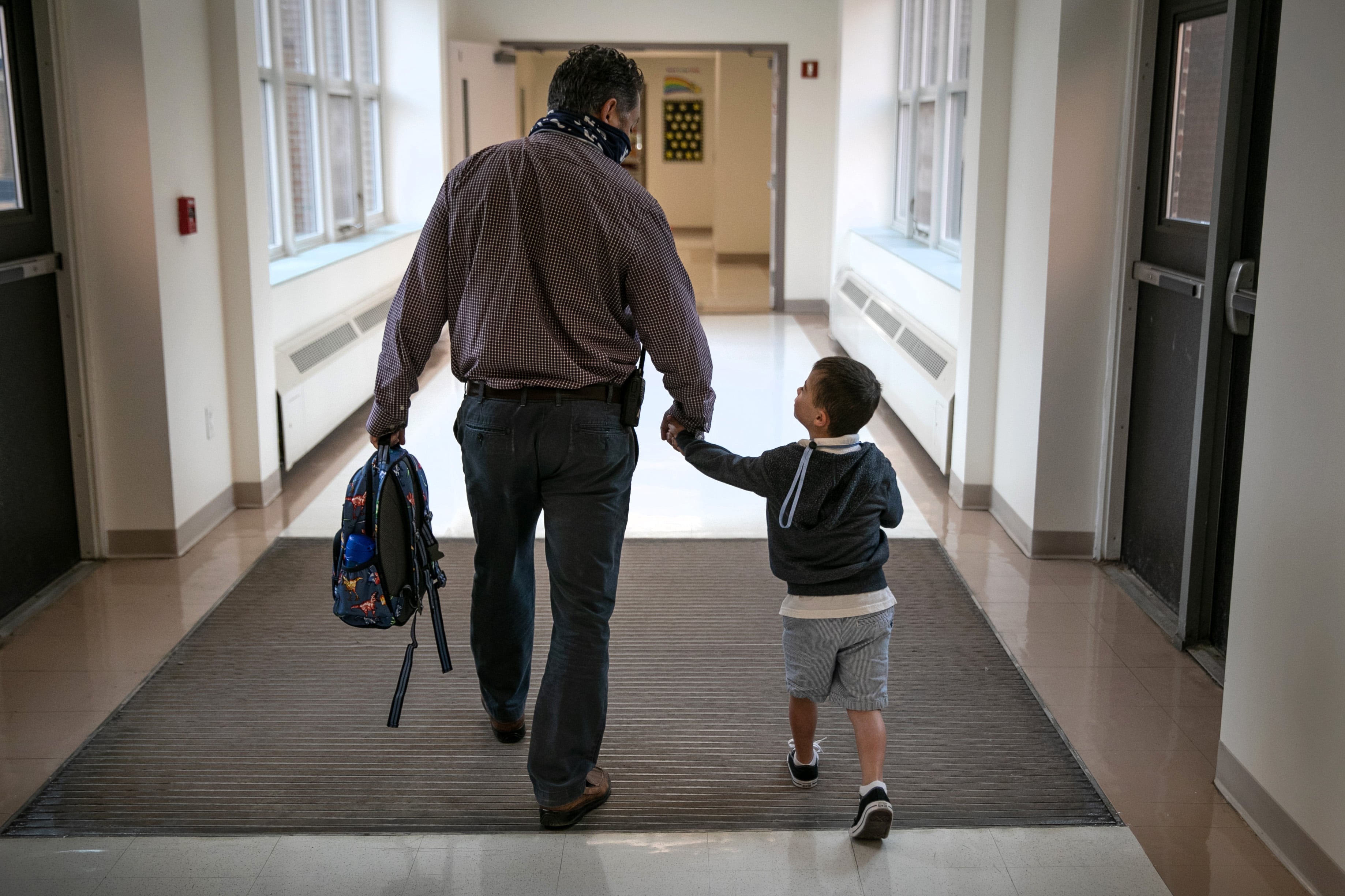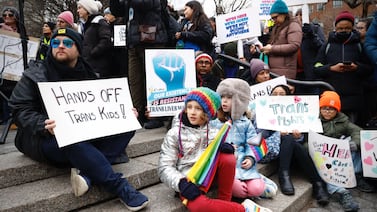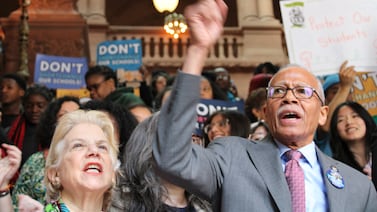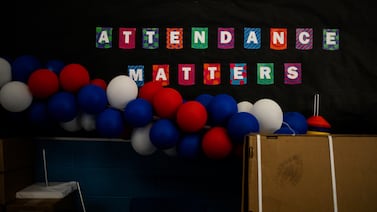Jane Stadnik regularly gets calls from Pennsylvania families whose young children are about to be suspended or expelled from preschool, often for things like throwing toys, pushing over furniture, or repeatedly running out of the classroom.
As a family resource specialist at the PEAL Center, a statewide advocacy group for children and youth with disabilities, her job is to help such families access therapy or other support so children can stay in their classrooms.
Her success rate is about 50%.
Some children get kicked out and some parents pull their children out voluntarily because they can’t afford to miss more work for suspensions or midday calls to pick up kids early.
“They’re worried that the next phone call is going to be the one to say, “Pick him up and don’t come back,’” she said.
In Pennsylvania, as in many other states, preschool suspensions and expulsions in public schools have decreased in the last several years. Despite this trend, such removals still happen and disparities based on race, gender and disability status persist. Some advocates fear the pandemic could stall or reverse recent gains.
Many preschool educators have already seen more behavior problems in their classrooms this fall. Not only did many children lose out on exposure to peers for more than a year, some missed being identified for special services, or absorbed the extra stress coursing through their families during the pandemic. In addition, many preschools are facing major staff shortages, leaving overwhelmed teachers to handle kids’ challenging behavior without much support.
“We’re seeing behaviors we haven’t seen in a long time and at a much higher rate,” said Becky Bohley, director of Kinder Academy-Trinity in northeast Philadelphia.
While her center is part of a small pilot program that aims, in part, to reduce suspensions and expulsions, Bohley said it wouldn’t surprise her if the pandemic fuels an increase in such discipline across early childhood programs.
“If ever there was a time I could see that happening again, it would be now,” she said.
Beyond the pandemic’s potential to ramp up preschool suspensions and expulsions, there are also big holes in the data on such discipline. The federal government tracks incidents of suspension and expulsion in school district classrooms, but no one’s tracking what happens in private preschools. There’s also little information on “soft” suspensions or expulsions, unofficial actions that can include sequestering a student in the preschool director’s office, asking the parent to pick a child up early, or counseling a family to find a preschool that’s a “better fit.”
Experts say the problem with any kind of removal from the classroom is that it doesn’t teach children the behavior adults want and robs them of valuable time in the classroom.
“We’re so concerned about absenteeism, but we as adult educators are forcing students to be absent by using suspension and expulsion,” said Richard Fabes, an Arizona State University professor.
“We should be concerned about anything that causes students to miss school, which undermines their learning, undermines their engagement in school.”
Good news, bad news
Nationwide, just over 2 in 1,000 preschool students enrolled in public school classrooms were suspended or expelled in the 2017-18 school year. That’s a big drop from the 2015-16 school year when the rate was more than 4 preschoolers per 1,000, according to an Arizona State University report examining federal early childhood discipline data.
While most states posted declines during that period, Pennsylvania’s drop in preschool suspensions and expulsions was even steeper than the national decline, going from about 3 per 1,000 students to .6 per 1,000 students.
Despite the decreases — at least for preschools in public schools — Black students are still suspended and expelled significantly more than white students.
Fabes, the lead author of the report, said the disparities are evident from preschool to high school, in blue states and red states, populous states and sparsely populated states, states with larger proportions of people of color and states without.
“Every way we have sliced and diced these data we see this disparity for Black students,” he said. “I just don’t think tweaking policies at the edges is going to do anything to address these gaps because they’re so pervasive.”
Fabes believes preschool suspension and expulsion should be banned completely, though he acknowledged that’s not likely. Many teachers and administrators believe it’s a tool they need despite evidence that it’s not effective, he said.
Suspending and expelling little kids does not improve their behavior or head off future discipline issues, he said. On the contrary, early suspensions and expulsions increase the risk students will receive similar punishments in later grades, and drop out of school altogether.
“These have implications for their lifelong success,” Fabes said.
Stadnik, of the PEAL Center, knows the desperation some of her clients feel because she felt the same way years ago when her son, who has an intellectual disability and autism, was in preschool. He would sometimes throw blocks over the shelves and hit unsuspecting children, or act out in other ways. She was a lead teacher at the center, but voluntarily moved to a lower assistant teacher position so she’d have more freedom to leave her own classroom to help her son when things spiraled out of control. Even then, she worried he could be kicked out and that she could lose her job.
“I know how stressful it is,” she said. “If you’re a single parent, you can’t give up your job. Everybody’s livelihood depends on you.”
New policies raise questions about quality
In 2014, the federal government published national preschool suspension and expulsion data for the first time. That was followed by an Obama administration push for states to adopt policies aimed at reducing such punishment in both preschool and child care.
In 2017, Pennsylvania officials mandated that early childhood programs receiving state or federal funding establish written procedures outlining efforts to reduce suspensions and expulsions. The state also started a hotline child care providers could call for help if they were considering suspending or expelling a child for challenging behavior. Over three years, there were about 70 calls to the hotline. The state has since switched to an online survey to offer such support, with 74 providers or parents responding to the survey over the last 16 months.
The Philadelphia school district prohibits preschool expulsion and severely limits suspensions among its 11,000 preschool students. Diane Castelbuono, the district’s deputy chief for early learning, said the policy, which in rare cases allows children to be moved to a different placement, applies to the 3,000 preschoolers enrolled in district-run classrooms and the remaining 8,000 who attend class in community-based preschools that contract with the district.
Shantel Meek, director of the Children’s Equity Project at Arizona State University, said the wave of state and local policies on early childhood suspension and expulsion, brought with it wide variation.
“We had a huge quantity of policy in the last eight years,” she said “I would like to see a move toward quality of policy … a clean-up of sorts, or a sharpening of sorts.”
One of the problems with many recent preschool suspension and expulsion policies is the laundry list of loopholes, she said. For example, the rules might prohibit the suspension or expulsion of young children, but allow a variety of exceptions that can be interpreted broadly.
“You can’t expel unless a child does one of these 30 things,” Meek said, offering an exaggerated example.
Meek also wishes there’d been more progress in capturing clear data about how many young children in preschool and child care are suspended or expelled each year, whether they attend public or private programs.
“That is still a huge gap,” she said.
Marsha Gerdes, a senior psychologist at Children’s Hospital of Philadelphia, said many early childhood teachers and directors wouldn’t think to label an unofficial removal — say, a child sent to “take a break” in the director’s office or another classroom — as a suspension, even though it ends up functioning the same way.
In her recent work studying a program aimed at boosting kids’ social and emotional skills at about a dozen local child care centers, she’s found it challenging to ensure staff members record discipline consistently.
“The not-recorded-at-all is really where we’re at with most child care centers,” she said. “As you look at this issue over time, we don’t have a really good ability to know if we’re making progress or not.”
Finding solutions to a tricky problem
There are a variety of programs, curriculums, and early intervention services that can help reduce or manage meltdowns, aggression, or other behavior that get small children into trouble.
Sometimes mental health consultants or other specialists work with preschool teachers, parents, or children themselves to help smooth out challenging behavior.
Pennsylvania has 29 early childhood mental health consultants, up from 13 in 2018, but advocates say that’s not enough to meet the state’s needs.
State officials report that 63% of about 2,700 consultations from 2013 to 2021 produced positive outcomes. In other words, children stayed in their early learning program. One hundred and seventeen children, or about 4%, were expelled, and 42 children, or about 2%, were expelled but the consultants helped them transition to a new program.
There are a host of training programs that help teachers build children’s problem-solving, relationship, and coping skills, such as The Incredible Years and Teacher-Child Interaction Training, and curriculums such as Second Step.
Gerdes, the Children’s Hospital psychologist, is studying the effectiveness of a program with similar aims. It’s called Early Childhood Positive Behavioral Interventions and Supports, or PBIS, and mirrors an approach often used in K-12 schools. The idea is to build children’s social and emotional skills with outside coaches helping a centerwide leadership team set priorities and address problems.
Preliminary data from the project shows improved classroom environments and a major reduction in suspensions across nine participating Philadelphia centers — from 28 to four. Gerdes knows the data may not be rock solid because of inconsistencies in discipline reporting methods, but believes the project is promising.
“Is it the answer to all suspensions and expulsion problems? I’m not positive yet,” she said.
Amy Lynch, an associate professor of occupational therapy in Temple University’s College of Public Health, in 2019 spearheaded her own pilot program in the city to help kids with emotional regulation after years of working with children who had experienced trauma.
“I thought, I can’t imagine that the number of kids being expelled [isn’t] also somehow directly related to kids who are experiencing the impacts of trauma,” she said.
With support from the local United Way and the advocacy group First Up, Lynch and her team developed a 12-week program, called PREPPS, in which therapists go into classrooms and lead lessons with titles like, “How does your engine run?,” “Asking with respect,” and “Accepting the no.” The lessons, which include songs and games, include teachers as participants so they can see how the skills should be taught and reinforced.
Bohley, the director of Kinder Academy-Trinity, said two of her four preschool classrooms are doing PREPPS this fall and the other two will start in January. She’s already seen progress, with children who previously sat out opting to join the PREPPS lessons and kids acting on what they’ve learned — for example, by taking calming “brownie breaths,” deep inhales as if they’re smelling a fresh-baked brownie and big exhales to cool it down.
“I love the program,” she said. “I think it’s incredibly valuable.”
Bohley said in her 11 years heading the center, she’s never expelled a child. But on occasion, she’s asked parents to pick up their children early or had children sit in her office to calm down.
“This is a program that can help us get to a place where we never have to do that,” she said.







